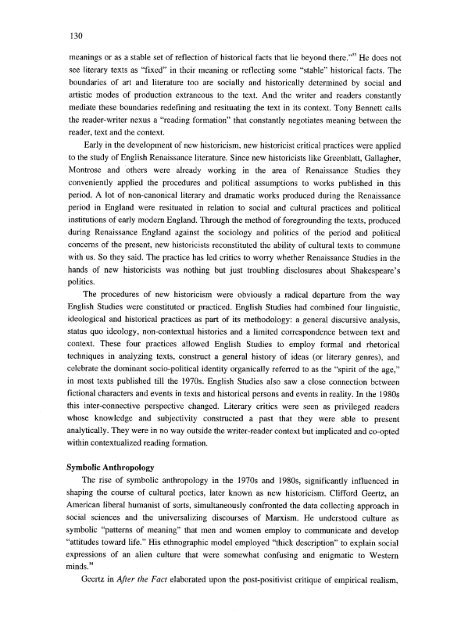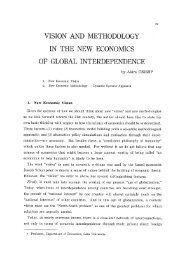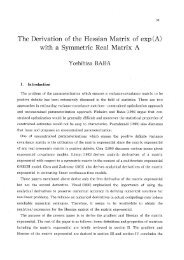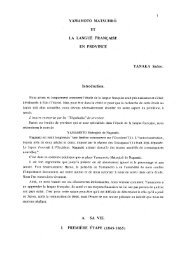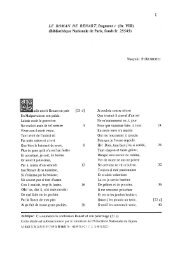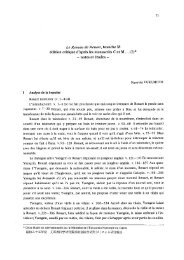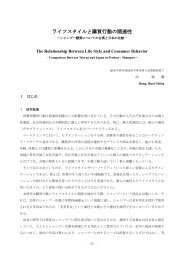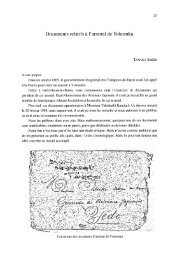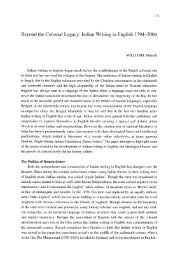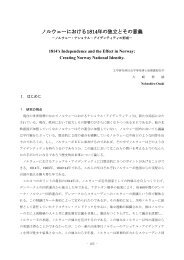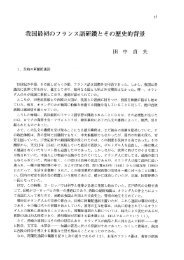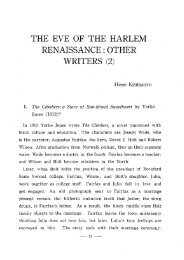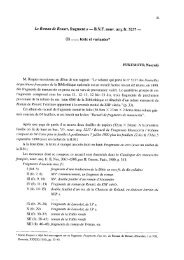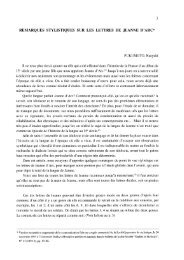New Historicism and Literary Studies - Soka University Repository
New Historicism and Literary Studies - Soka University Repository
New Historicism and Literary Studies - Soka University Repository
You also want an ePaper? Increase the reach of your titles
YUMPU automatically turns print PDFs into web optimized ePapers that Google loves.
130<br />
meanings or as a stable set of reflection of historical facts that lie beyond there."53 He does not<br />
see literary texts as "fixed" in their meaning or reflecting some "stable" historical facts. The<br />
boundaries of art <strong>and</strong> literature too are socially <strong>and</strong> historically determined by social <strong>and</strong><br />
artistic modes of production extraneous to the text. And the writer <strong>and</strong> readers constantly<br />
mediate these boundaries redefining <strong>and</strong> resituating the text in its context. Tony Bennett calls<br />
the reader-writer nexus a "reading formation" that constantly negotiates meaning between the<br />
reader, text <strong>and</strong> the context.<br />
Early in the development of new historicism, new historicist critical practices were applied<br />
to the study of English Renaissance literature. Since new historicists like Greenblatt, Gallagher,<br />
Montrose <strong>and</strong> others were already working in the area of Renaissance <strong>Studies</strong> they<br />
conveniently applied the procedures <strong>and</strong> political assumptions to works published in this<br />
period. A lot of non-canonical literary <strong>and</strong> dramatic works produced during the Renaissance<br />
period in Engl<strong>and</strong> were resituated in relation to social <strong>and</strong> cultural practices <strong>and</strong> political<br />
institutions of early modern Engl<strong>and</strong>. Through the method of foregrounding the texts, produced<br />
during Renaissance Engl<strong>and</strong> against the sociology <strong>and</strong> politics of the period <strong>and</strong> political<br />
concerns of the present, new historicists reconstituted the ability of cultural texts to commune<br />
with us. So they said. The practice has led critics to worry whether Renaissance <strong>Studies</strong> in the<br />
h<strong>and</strong>s of new historicists was nothing but just troubling disclosures about Shakespeare's<br />
politics.<br />
The procedures of new historicism were obviously a radical departure from the way<br />
English <strong>Studies</strong> were constituted or practiced. English <strong>Studies</strong> had combined four linguistic ,<br />
ideological <strong>and</strong> historical practices as part of its methodology: a general discursive analysis ,<br />
status quo ideology, non-contextual histories <strong>and</strong> a limited correspondence between text <strong>and</strong><br />
context. These four practices allowed English <strong>Studies</strong> to employ formal <strong>and</strong> rhetorical<br />
techniques in analyzing texts, construct a general history of ideas (or literary genres), <strong>and</strong><br />
celebrate the dominant socio-political identity organically referred to as the "spirit of the age ,"<br />
in most texts published till the 1970s. English <strong>Studies</strong> also saw a close connection between<br />
fictional characters <strong>and</strong> events in texts <strong>and</strong> historical persons <strong>and</strong> events in reality. In the 1980s<br />
this inter-connective perspective changed. <strong>Literary</strong> critics were seen as privileged readers<br />
whose knowledge <strong>and</strong> subjectivity constructed a past that they were able to present<br />
analytically. They were in no way outside the writer-reader context but implicated <strong>and</strong> co-opted<br />
within contextualized reading formation.<br />
Symbolic Anthropology<br />
The rise of symbolic anthropology in the 1970s <strong>and</strong> 1980s, significantly influenced in<br />
shaping the course of cultural poetics, later known as new historicism. Clifford Geertz, an<br />
American liberal humanist of sorts, simultaneously confronted the data collecting approach in<br />
social sciences <strong>and</strong> the universalizing discourses of Marxism. He understood culture as<br />
symbolic "patterns of meaning" that men <strong>and</strong> women employ to communicate <strong>and</strong> develop<br />
"attitudes toward life ." His ethnographic model employed "thick description" to explain social<br />
expressions of an alien culture that were somewhat confusing <strong>and</strong> enigmatic to Western<br />
minds.54<br />
Geertz in After the Fact elaborated upon the post-positivist critique of empirical realism,


